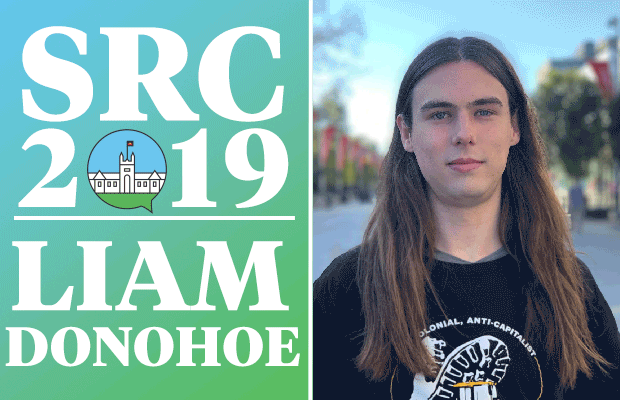Editors Pranay Jha and Liam Thorne are not involved in the 2019 coverage of the Honi Soit, NUS and SRC elections.
A Chinese translation of this article can be found here.
Quiz score: 68%
SRC presidential candidate Liam Donohoe has been hailed as this year’s uniter of the broad left on campus. A self proclaimed “mediocre” debater, ex-editor of this most iconic of “left” student newspapers, student politics progressive hack and 2017 member of the General Executive under Isabella Brook’s presidency. The reality of that unification, however, appears to be one of pragmatic opposition to the Liberals rather than ideological support for Donohoe’s cause.
In a two-fold race perhaps more polarised than many in recent memory, the support of centre and centre left factions Unity (Labor Right) and NLS, who were evidently devoid of a suitable candidate, have appeared at a good time for Donohoe. In their lack of candidate, Donohoe has found an opportunity. But the factions continue to work disparately, with the ideology of Grassroots, what Donohoe deems “the left” and Switch, the “centre left” being the only exception to this factional separation. Notably, the Labor factions played no role in the development of Donohoe’s policies.
Perhaps to bridge this gap, perhaps to make himself more electable, Donohoe has formed a campaign that seems to be just as much about providing student services as it is about supporting activism. This, he tells Honi, is the reason his faction moved to preselect him over Grassroots forerunner and 2019 Sexual Harassment officer Jazz Breen. In a departure from recent Grassroots candidates, Donohoe pointed to his experience managing Riverview’s debating program, one line on his CV amongst more than 18 activist-related CV lines and a pledge to resource the collectives to ensure a “comprehensive program of activism.”
Donohoe’s knowledge and appreciation for the structure and historical legacies of the SRC is a product of his longstanding proximity with the organisation as well as Grassroots’ immense institutional knowledge. He played an active, even explanatory role in Honi’s interview with him. When asked what the organisation’s most important achievement has been, he tactically avoided the activist-services distinction that has plagued Grassroots candidates in recent years, instead citing the SRC legal service. Donohoe later gave vague answers to a question about the Legal Service’s long standing governance issues. He also failed to identify which SRC service was misrepresented by incumbent Jacky He in an SRC report this year. But Donohoe’s positioning behind the SRC as a services-activism provider is strategic. On one hand, it serves to dampen right-of-centre criticisms that Grassroots is purely activist. On the other, it emphasises Donohoe’s branding as a fix for this year’s core services drawbacks, including the lawsuits, departures and upsets which have embroiled the Legal Service.
Donohoe’s history with the institution are certainly a credit to his experience, but that history involves uncompromising relationships with other factions. While his politics have certainly changed since a brief flirtation with the Socialist Alternative back in 2016, Donohoe, who tells Honi he has embraced more pluralist attitudes, had heated exchanges and near-physical clashes with Panda and Liberal bloc late last year. In the event, Jakovac’s bloc becomes opposition on next year’s Council, it’s hard not to see them returning the favour: pulling quorum, obstructing motions and complicating Donohoe’s overall policy agenda.
Donohoe’s knowledge of emerging issues, including OLEs, is more limited than Jakovac’s. That much is obvious from the fact that Donohoe could only name the widely-memed OLET1137 “Australian Perspectives: Rugby League” OLE in the quiz. Although no fault of his own that he is a student later in degree progression, that may highlight a weak point in Donohoe’s ability to advocate for younger students.
The spirit of bipartisanship under a Donohoe presidency may survive, however, guided by historically popular policies like the implementation of a specialist sexual assault lawyer which attracted the support of numerous factions in 2017. Although practical circumstances have impeded these plans before including under Grant’s leadership in 2018, a vacancy in the Legal Services arm, increasing demand, combined with increased campus attention ahead of the 2020 national survey on student sexual assault may well bolster the prospects of this policy getting over the line.
The rest of the policy agenda is well-considered, but suffers from several practical impediments. Donohoe wants to develop a free food bank, borrowing from OzHarvest, an organisation which students can already access. He has pledged regular stalls along major thoroughfares aimed at improving the SRC’s visibility, but those ideas were loosely sketched and lacked the concreteness of a “Welfare Week” or “Health Day”, this year’s SRC outreach program at the Mallett Street Nursing Campus which Donohoe commended.
Donohoe treaded carefully around the recent debates of sinophobia on university campuses, telling Honi “it’s a very complex issue” and “I’m not going to pretend I have all the answers.” A testament to his maturity, Donohoe acknowledged that the international student concession campaign had elicited little material gains. Whilst he noted international students as one of the factors changing student interests in the last decade, he believed conditions had improved, telling Honi “I think it’s easier, I don’t know this for sure, to be an international student now than it has been previously.”
Having promised deferral of next year’s studies if elected, Donohoe has pledged to be a 5 day a week, 9-5 president, a welcome change from this year and a shame that it comes after our tragic departure.
View the questions from this year’s quizzes here.
Honi is hosting the annual Presidential Debate on Wednesday 18 September from 1pm at Hermanns.
Submit a question to your candidates here.
Got feedback or goss? Send us a tip.





